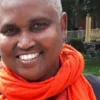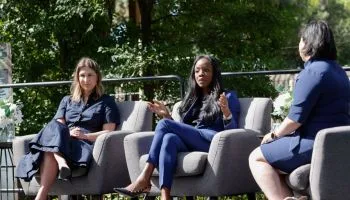
Source: PeopleImages / Getty
The Black Health 365 podcast explores eating disorders and the trauma, stigmatization and lack of visibility of this issue in the Black community.
Black Health 365 hosts Jackie Paige and Britt Daniels are joined by licensed psychologist Dr. Ebony Butler to shed light on the different types of eating disorders and how they relate to body image and our problematic diet culture.
Dr. Ebony is a licensed psychologist and food relationship strategist on a mission to help women of color heal from food and body trauma as a result of diet culture. As a former weight loss coach, she began to question the conventional mindset about fitness and body image.
“It never felt aligned. I felt like I was telling people, ‘As long as you’re skinny, you’re good.’ And I didn’t like that. It didn’t make sense to me,” she says.
Eating Disorders, Diet Culture and Racism
Diet culture is rooted in anti-Blackness, Dr. Ebony explains, resulting in the pursuit of white European beauty standards and perceiving different bodies as less desirable.
“The world that we live in, I can see why we’re desperate to change our bodies,” she says. “Because the bodies that are slim, those are the bodies that are accepted.”
Eating disorders, such as anorexia and bulimia, are a result of diet culture. “By definition, an eating disorder is a pattern of eating where you are restricting or purging to eliminate food from your body to be within a particular weight range or manage a particular type of anxiety,” says Dr. Ebony.
She explains the difference between eating disorders and disordered eating. A diagnosable eating disorder “significantly disrupts your daily functioning,” Dr. Ebony explains, while disordered eating patterns show up as behaviors such as “starving ourselves, exercising excessively to shrink your body, purging, laxatives or extreme nutrient counting.”
Having a Healthy Relationship with Food
Dr. Ebony’s work now focuses on helping people have healthy relationships with food and their bodies. The first step is to identify what is driving their desire to lose weight. “Are we doing this because that’s what you love or are we doing this to be good enough? And if we’re doing it to be good enough, let’s work on the part of you that’s feeling like you’re not good enough,” she says.
It’s about empowering people to discover the “ways that we can build a life that is in alignment with who we want to be and how we want to live, and what feels healthy for us,” says Dr. Ebony.
Compassion is a major part of body acceptance, she explains.
“If we’re going to try to find our way back to our bodies and really find home in our bodies again, we do have to meet it with some compassion,” she says. “I have to remind myself of what my body does and what it’s doing for me, because it’s easy to get sucked into the negativity of it all and just wanting it to look a particular type of way.”
Listen to “What We Aren’t Talking Enough About: Eating Disorders in the Black Community” on the Black Health 365 podcast. Also available on Apple and Spotify.
SEE ALSO:
Black Health 365: Black Men And The Power Of Vulnerability
Black Health 365: The Thing About Food Insecurity In Our Communities



